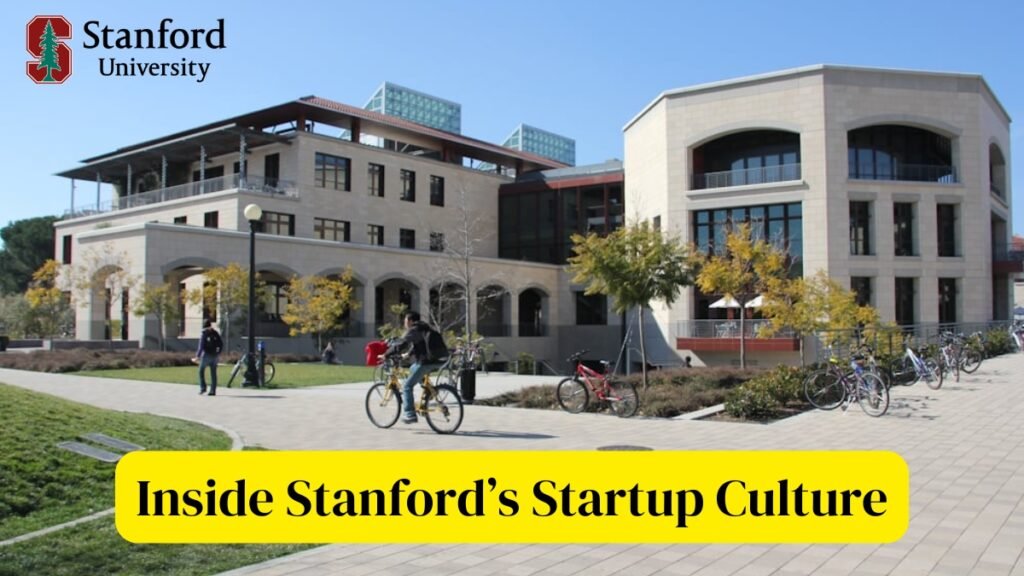Stanford University has long been recognized as the birthplace of some of the world’s most successful startups, producing entrepreneurs who have built companies like Google, Tesla, LinkedIn, Instagram, and WhatsApp. Located in the heart of Silicon Valley, Stanford’s unique ecosystem fosters innovation, entrepreneurship, and technological breakthroughs.
What makes Stanford such a hotbed for startups? This article explores the key factors that contribute to Stanford’s startup culture, from its academic programs and research labs to venture capital connections and an entrepreneurial mindset.
1. The Perfect Location: Stanford in the Heart of Silicon Valley
Stanford’s geographical advantage cannot be overstated. Located in Palo Alto, California, the university sits at the center of Silicon Valley, home to tech giants like Apple, Google, Meta (Facebook), and Tesla. This proximity provides students and faculty with direct access to the world’s top entrepreneurs, investors, and business leaders.
- Networking Opportunities: Silicon Valley hosts countless tech conferences, pitch events, and meetups, allowing Stanford students to build industry connections early in their careers.
- Exposure to Cutting-Edge Innovation: Being close to leading AI labs, biotech firms, and venture capitalists enables students to stay ahead in emerging industries.
2. Entrepreneurial Mindset: Encouraging Risk-Taking
One of the defining traits of Stanford’s startup culture is its encouragement of risk-taking. Unlike traditional universities that focus solely on academic success, Stanford fosters an entrepreneurial spirit where failure is seen as a stepping stone to success.
- “Fail Fast, Learn Fast” Mentality: Stanford students are encouraged to experiment with ideas, pivot when necessary, and view failures as learning experiences.
- Startup-Friendly Curriculum: Many Stanford courses, such as “Lean LaunchPad” and “Technology Ventures”, teach students how to develop and test startup ideas.
Notable example: Larry Page and Sergey Brin were Ph.D. students at Stanford when they built Google’s search algorithm—their willingness to take risks transformed their research project into one of the most successful companies in history.
3. World-Class Faculty and Research Labs
Stanford boasts some of the best research facilities in the world, making it a prime location for students looking to launch startups based on cutting-edge innovations. The university’s faculty includes Nobel Prize winners, AI pioneers, and leading business thinkers who mentor students and encourage real-world applications of their research.
Top Research Hubs Driving Innovation
- Stanford Artificial Intelligence Lab (SAIL) – A leader in AI research, producing breakthroughs in machine learning and robotics.
- Stanford Biodesign Program – Helps students develop medical technologies and health tech startups.
- Precourt Institute for Energy – Focuses on sustainable energy innovations, driving climate-focused startups.
Many Stanford-born startups have emerged from university research labs, including Sun Microsystems, BioNTech, and DeepMind.
4. Strong Support System for Startups
Stanford provides structured resources to help students turn their ideas into companies. These include:
1. Startup Incubators & Accelerators
- StartX: Stanford’s startup accelerator that provides funding, mentorship, and office space for early-stage companies.
- Stanford Venture Studio: A startup hub for student entrepreneurs to develop their business ideas.
2. Business Plan Competitions
Stanford hosts several high-profile startup competitions where students pitch their ideas to investors and win funding.
- The Stanford Ignite Program: Helps students and alumni commercialize tech innovations.
- BASES 100K Startup Challenge: A competition offering up to $100,000 in seed funding to student-led startups.
Many successful companies, including DoorDash, started from these programs.
5. Access to Venture Capital and Angel Investors
Stanford has strong ties to Silicon Valley’s venture capital (VC) ecosystem, making it easier for student startups to secure funding. Some of the world’s biggest VC firms, including Sequoia Capital, Andreessen Horowitz, and Kleiner Perkins, are founded or run by Stanford alumni.
- Peter Thiel, a Stanford graduate and co-founder of PayPal, has funded numerous Stanford startups through his Thiel Fellowship and investments.
- Reid Hoffman, co-founder of LinkedIn, actively invests in Stanford-born companies.
Stanford’s alumni network, which includes thousands of successful entrepreneurs, investors, and executives, often serves as a funding pipeline for new student-led startups.
6. Stanford’s Startup Success Stories
Some of the most influential companies in the world were started by Stanford students and faculty:
- Google – Founded by Larry Page and Sergey Brin while studying at Stanford’s AI lab.
- Tesla – Co-founded by JB Straubel, an alumnus of Stanford’s engineering program.
- Instagram – Created by Kevin Systrom and Mike Krieger while they were Stanford students.
- DoorDash – Launched by Stanford students Tony Xu, Stanley Tang, and Andy Fang during a business course.
- Snapchat – Developed by Evan Spiegel, Bobby Murphy, and Reggie Brown at Stanford.
These companies have generated trillions of dollars in market value, reinforcing Stanford’s status as a startup powerhouse.
7. Challenges and The Future of Stanford’s Startup Culture
Despite its incredible success, Stanford faces challenges in maintaining its dominance in startup culture:
- Big Tech Absorption: Many talented Stanford graduates now join Google, Apple, or Meta instead of launching their own companies.
- High Cost of Living: The rising costs in Silicon Valley make it harder for students to sustain startups in their early stages.
- Increasing Global Competition: Other universities like MIT, Harvard, and UC Berkeley are producing more high-impact startups, challenging Stanford’s leadership.
To stay ahead, Stanford continues investing in AI, biotech, and sustainable technology, ensuring its startup ecosystem remains the gold standard for innovation.
Conclusion: Why Stanford is the Ultimate Startup Incubator
The Stanford startup ecosystem is unmatched in its ability to nurture entrepreneurs and turn ideas into billion-dollar companies. Through academic excellence, risk-taking culture, VC access, and mentorship, Stanford continues to be the leading force behind Silicon Valley’s most transformative innovations.
As the tech world evolves, Stanford’s startup culture will continue to drive the future of AI, biotech, fintech, and beyond, ensuring that the next generation of entrepreneurs emerges from its campus.
For aspiring entrepreneurs, there is no better place to start than Stanford University – the true engine of Silicon Valley innovation.
